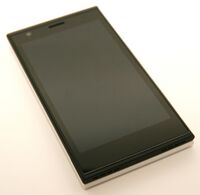Jolla Phone (jolla-sbj): Difference between revisions
Appearance
PureTryOut (talk | contribs) Added USB connection instructions |
PureTryOut (talk | contribs) mNo edit summary |
||
| Line 23: | Line 23: | ||
* Compiling the kernel from the Jolla sources which should provide everything to run Wayland since that's what Sailfish uses | * Compiling the kernel from the Jolla sources which should provide everything to run Wayland since that's what Sailfish uses | ||
* Flashing | |||
* Booting | * Booting | ||
* USB | * USB | ||
* SSH (after some manual configuration) | * SSH (after some manual configuration) | ||
== Flashing mode == | == Flashing mode == | ||
Revision as of 16:33, 21 February 2018
 Jolla Phone | |
| Manufacturer | Jolla |
|---|---|
| Name | Phone (?) |
| Codename | sbj |
| Released | 2013 |
| Hardware | |
| Chipset | Qualcomm Snapdragon 400 |
| CPU | Dual-core 1.4 GHz Krait 300 |
| GPU | Adreno 305 |
| Display | 540x960 IPS |
| Storage | 16 GB |
| Memory | 1 GB |
| Software | |
| Original software | Sailfish 1 |
| postmarketOS | |
| Category | testing |
| Pre-built images | no |
| Mainline | no |
| Flashing |
No data |
|---|---|
| USB Networking |
No data |
| Internal storage |
No data |
| SD card |
No data |
| Battery |
No data |
| Screen |
No data |
| Touchscreen |
No data |
| Multimedia | |
| 3D Acceleration |
No data |
| Audio |
No data |
| Camera |
No data |
| Camera Flash |
No data |
| Connectivity | |
| WiFi |
No data |
| Bluetooth |
No data |
| GPS |
No data |
| NFC |
No data |
| Modem | |
| Calls |
No data |
| SMS |
No data |
| Mobile data |
No data |
| Miscellaneous | |
| FDE |
No data |
| USB OTG |
No data |
| HDMI/DP |
No data |
| Sensors | |
| Accelerometer |
No data |
| Magnetometer |
No data |
| Ambient Light |
No data |
| Proximity |
No data |
| Hall Effect |
No data |
| Haptics |
No data |
| Barometer |
No data |
Contributors
- MartijnBraam
- PureTryOut
What works
- Compiling the kernel from the Jolla sources which should provide everything to run Wayland since that's what Sailfish uses
- Flashing
- Booting
- USB
- SSH (after some manual configuration)
Flashing mode
The Jolla phone uses fastboot from the Mer project rather than Android. To enter fastboot shut down the device, then plug in the USB lead while holding down volume down.
USB connection
The USB connection works, but needs some manual configuration (as found here).
First, find the interface name using ip a.
Then, we have to assign the device a mac address (replace the interface name with what you found from the previous command).
# ip l set enp1s0f0u3: address 12:12:12:12:12:12Lastly, add an IP address.
# ip address add dev enp1s0f0u3 172.16.42.2/24You can now use SSH to connect to the device on 172.16.42.1.